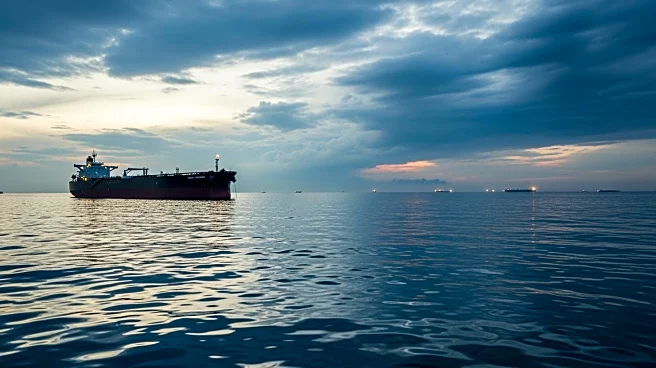What's Happening?
Iran's Revolutionary Guards have seized a tanker in Gulf waters carrying petrochemicals bound for Singapore, citing alleged violations. The incident marks the first reported seizure by Tehran since Israeli-U.S.
strikes on Iran in June. The Marshall Islands-flagged tanker, named Talara, was intercepted and diverted into Iranian territorial waters. The vessel was carrying high-sulphur gasoil from Sharjah in the UAE to Singapore. Columbia Shipmanagement, the vessel's manager, lost contact with the Talara off the coast of Khor Fakkan, UAE, and is working with maritime security agencies to restore communication. The U.S. military is monitoring the situation closely.
Why It's Important?
The seizure of the tanker by Iran highlights ongoing tensions in the Gulf region, which could impact global oil supply and maritime security. Such actions by Iran have historically led to increased scrutiny and potential disruptions in international shipping routes. The incident may affect oil prices and contribute to geopolitical instability, influencing U.S. foreign policy and military strategy in the region. Stakeholders in the shipping and oil industries may face increased risks and costs due to heightened security measures and potential retaliatory actions.
What's Next?
The U.S. military's active monitoring of the situation suggests potential diplomatic or military responses to ensure the safety of commercial vessels in the region. Iran's actions may prompt international calls for increased maritime security and cooperation among Gulf states. The incident could lead to further negotiations or sanctions aimed at curbing Iran's maritime activities. Shipping companies may need to reassess their routes and security protocols to mitigate risks associated with transiting through Gulf waters.
Beyond the Headlines
The seizure underscores the complex geopolitical dynamics in the Gulf, where maritime security is intertwined with broader regional conflicts and diplomatic relations. Iran's actions may be viewed as a strategic move to assert control over its territorial waters and challenge international norms. The incident could influence future negotiations on maritime law and security, impacting legal frameworks governing international shipping.









